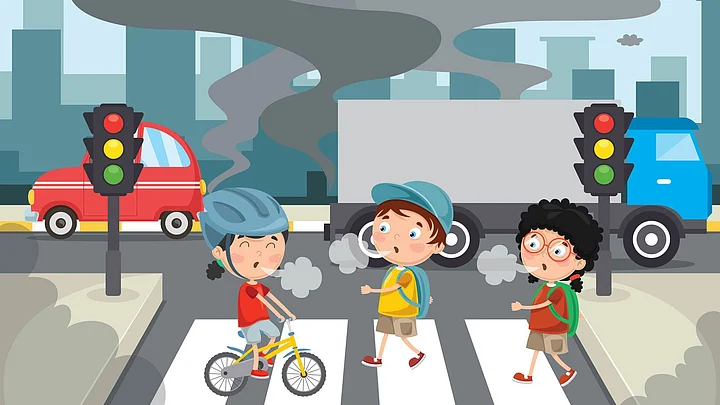As we approach the end of yet another year and the dawn of a new one, it is time to reflect on the year gone by and some of the things that left an indelible impression on our minds.
While governance structures around the world continue to battle amongst themselves and across geographic boundaries on what issues, by their opinions, matter and require their attention, one cannot afford to miss the cry for action from a hitherto unseen quarter.
The wave of movements by no less than our very own children from every continent in the world demanding a future that is secure, warrants a sense of urgency for action amongst the powers-that-be.
In a never-before moment, 2019 witnessed a clarion call to governments around the world by children who recognize that the future for them and coming generations is rather bleak- one that is fraught with threatened natural resources (air, water and food).
Often polluted beyond permissible levels of human consumption, diminishing food and nutrition security, unhealthy cities with growing populations, diminishing green spaces and an unsustainable imbalance in utilities and access to healthcare services, coupled with a sustained onslaught on their very right to live, breath, eat and play – the characteristics of a healthy and happy childhood.
A recent report released, uncannily, on Children’s Day in India brought to focus the deleterious effects of a changing climate on the health of our children.
Dr Stella Hartinger, co-author of The Lancet Countdown Report on Climate Change and Health from Cayateno Heredia University, Peru, said,
Dioreahh, Heatwaves: More Trouble for India
With its huge population and high rates of healthcare inequality, poverty and malnutrition, few countries are likely to suffer from the health effects of climate change as much as India.
Diarrheal infections, a major persistent cause of child mortality, will spread into new areas, facilitated by favorable climatic suitability for the transmission of the pathogen vibrio cholera, rising by 3% a year since the early 1980s in India.
Deadly heatwaves like the one in 2015 that killed thousands of people in India could soon become the norm. India saw an additional 45 million exposures to heatwaves amongst our vulnerable populations over the age of 65 years.
Labor hours lost in the agriculture sector alone was close to 12 million hours according to data from 2018 raising concern on the economic impacts on individual, household and national budgets.
Mosquito-borne diseases like malaria, dengue and chikungunya are increasingly being detected in hitherto unknown parts of the country. Rising temperatures impact crop yield with substantial impacts on food availability and nutrient content of staples like maize, wheat, rice and soybean.
In a nation where undernutrition continues to be of major concern, the augmentation of the vicious cycle of poor nutrition — increased vulnerability to infectious diseases, spells concern for our children.
The elephant in the room is doubtless the diminishing air quality in many parts of the country, with the current groundswell from all quarters- children, adults and activists in the Delhi-NCR region demanding a right to breathe, serving to increase the visibility for an issue that surfaces with familiar regularity every year, but failing so far to elicit the requisite collective response that alone can combat the problem.
How Far Are We from The Global Climate Goals?
In order to meet the UN climate goals and inch our way towards meeting the commitments of the Paris agreement of limiting our global emissions across sectors, and paving the way to set a roadmap for keeping the temperature rising well below 2°, there is an immediate need for a coherent and co-ordinated response from governments around the world to step up our efforts to address the low- hanging fruits for action.
Nothing short of a 7.4% year-on –year cut in fossil fuel CO2 emissions from 2019 to 2050 will limit global warming to the more ambitious goal of 1.5 ° C.
While India is joining the global shift towards renewable energy, it still overwhelmingly relies on coal for electricity, with an 11% increase in its energy from burning coal in 2016-2018, compared to less than a 1.5% rise in China.
To dramatically reduce emissions by 2050, and to meet multiple Sustainable Development Goals, India must transition away from coal and towards renewable energy. It will also need to enhance public transport, increase use of cleaner fuels, and improve waste management and agricultural production practices.
The target may seem formidable but with children and their health at the center of this discourse, individuals, institutions and governments have an obligation to set immediate, short-term, mid-term and long-term targets on the road to decarbonizing all our activities.
A child born today is predicted to live in a world that is atleast four degrees warmer by the time she or he reaches their 70th birthday, signifying a lifetime of detrimental exposures to extreme climatic conditions and the consequent impact on their health and living conditions.
As The Lancet Report signified, “it will take the collective work of 7.5 billion people currently alive to ensure that the health of a child born today isn’t defined by a changing climate.”
One hopes that the upcoming United Nations Framework Convention on Climate Change (UNFCC) deliberations at COP 25 will witness critical commitments and decisions at the highest level from all nations.
The future we create is the one that we leave behind for our children and there is no better time to begin than now.
(This story was auto-published from a syndicated feed. No part of the story has been edited by FIT.)
(India, and the Capital especially, has been in an air pollution crisis. How has the hazardous air #pollution impacted you? Write down your #PollutionKaSolution and send it to us at FIT@thequint.com. )
(At The Quint, we question everything. Play an active role in shaping our journalism by becoming a member today.)
